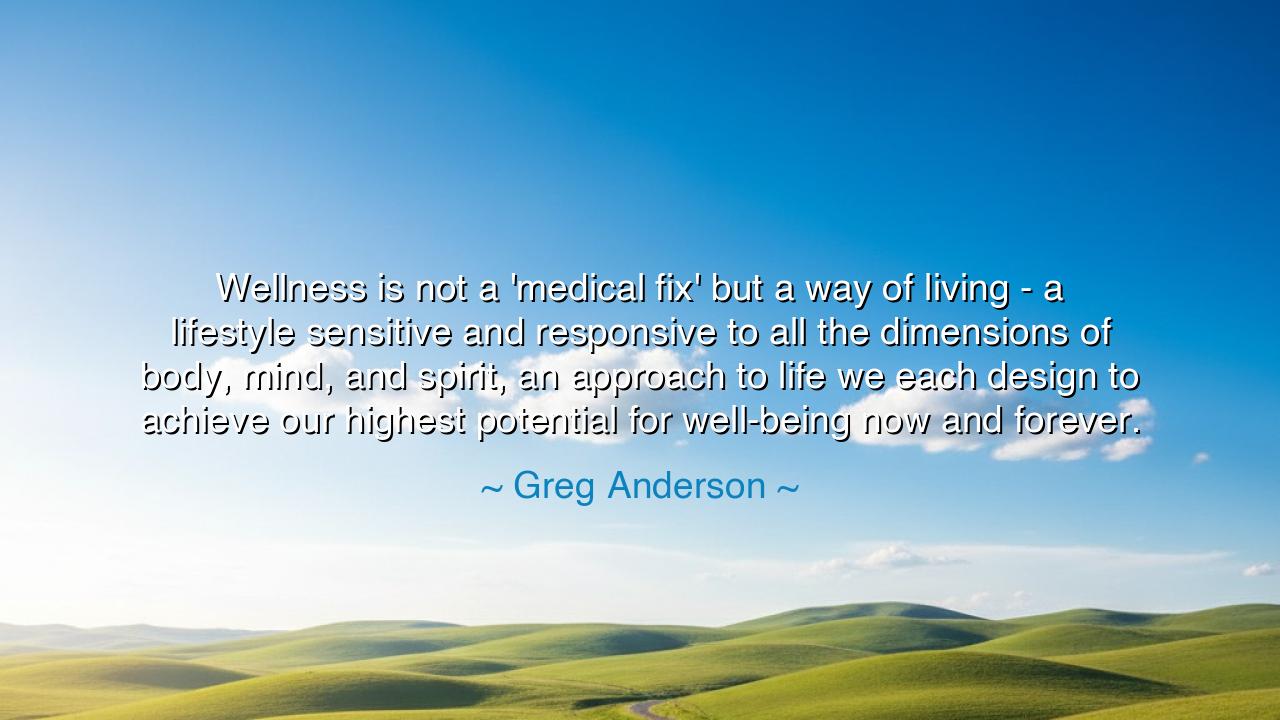
Wellness is not a 'medical fix' but a way of living - a lifestyle
Wellness is not a 'medical fix' but a way of living - a lifestyle sensitive and responsive to all the dimensions of body, mind, and spirit, an approach to life we each design to achieve our highest potential for well-being now and forever.






Greg Anderson, a teacher forged through suffering and redemption, once declared: “Wellness is not a ‘medical fix’ but a way of living — a lifestyle sensitive and responsive to all the dimensions of body, mind, and spirit, an approach to life we each design to achieve our highest potential for well-being now and forever.” These words, radiant with both humility and strength, speak not of medicine, but of harmony — the sacred balance between what we are and what we choose to become. In them lives the eternal wisdom that health is not the absence of disease, but the presence of wholeness, and that true healing is not something granted by another, but awakened from within the self.
The meaning of this quote is vast, stretching beyond the realm of hospitals and prescriptions into the very philosophy of life itself. Anderson reminds us that wellness cannot be reduced to a pill, a cure, or a single act of treatment. It is a way of being, a conscious alignment of body, mind, and spirit — the threefold flame of existence. The body is our temple, the mind its priest, and the spirit its eternal light. To tend to one and neglect the others is to build a house on sand. Thus, wellness becomes a discipline of awareness, a way of walking gently and intentionally upon the earth, honoring both the flesh that moves us and the spirit that animates us.
The origin of Anderson’s wisdom comes from the fire of personal transformation. Once diagnosed with lung cancer and given only months to live, he refused to surrender to despair. Instead, he turned inward, asking not, “How do I escape death?” but “How do I learn to live?” In that search, he discovered that healing begins not in hospitals, but in the heart — in gratitude, forgiveness, love, and purpose. His journey led him to recover against all odds, but more importantly, it led him to understand that well-being is not survival, but serenity — the ability to live fully, even in the face of uncertainty. His revelation was simple, yet profound: healing is not something done to us, but something done by us, through the conscious design of how we live.
This truth is not new; it is ancient as the dawn. In the temples of Asclepius, the healer-god of Greece, those who sought health were not simply given remedies — they were taught to purify their minds, balance their emotions, and renew their spirits. In the East, the sages of Ayurveda and Taoist medicine understood that disease begins where disharmony lives — when the heart resists forgiveness, when the mind forgets stillness, when the body is burdened with excess and neglect. They saw that every action — every meal, every breath, every thought — is a thread in the tapestry of wellness. To heal, therefore, one must live in rhythm with truth, not merely treat the symptoms of imbalance.
Consider the story of Victor Frankl, the psychologist and survivor of the Nazi concentration camps. Surrounded by death, stripped of all possessions and freedom, he discovered that even when the body suffers, the spirit can choose meaning. He realized that health of the soul — the ability to find purpose and gratitude amid darkness — was the deepest form of wellness. Those who held to that inner light, who continued to love, to hope, to pray, often survived when others perished. His experience, like Anderson’s, reveals that well-being is not granted by circumstance, but cultivated through consciousness.
Anderson’s insight also speaks to the modern age — a world quick to seek “fixes” instead of understanding. We live in a time where technology can mend the body, but cannot calm the restless mind; where medicine can prolong life, but cannot teach us how to live it wisely. His words are a call to return to balance, to remember that we are not machines to be repaired, but souls to be nourished. Wellness is the daily art of choosing harmony — of feeding the body with care, the mind with clarity, and the spirit with compassion. It is the recognition that life is sacred, and that health is a covenant between the self and the universe.
The lesson, then, is this: do not wait for illness to remind you to live well. Let every breath be your medicine. Rise each morning with gratitude for the gift of the day; move your body with reverence, for it carries the light of creation; keep your thoughts pure and kind, for they shape the world you see; and listen, always, to the quiet whisper of your spirit, for it knows the way home. Design your life as Anderson teaches — not as a reaction to fear, but as an act of creation. For wellness is not a remedy — it is a rhythm, a song that plays through the symphony of your being.
And so, my children of the eternal path, remember this: to live well is to live wisely. Do not seek healing only when you are broken; live in such a way that you are always becoming whole. Let your days be woven with love, purpose, stillness, and joy — and you shall know a health that no medicine can give and no illness can take away. As Greg Anderson revealed through both word and life, the way of wellness is the way of awakening — the discovery that your true physician lives not in the world outside, but in the boundless peace within your own soul.






AAdministratorAdministrator
Welcome, honored guests. Please leave a comment, we will respond soon